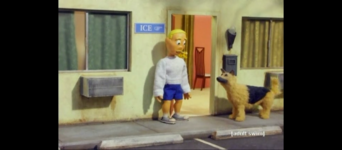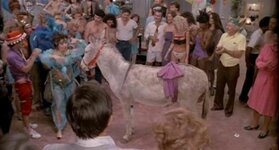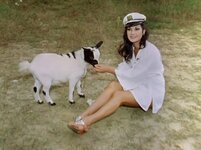There’s an Australian show called “Rake” which is actually really good it’s about a lawyer and the interesting cases he represents. In one of the cases a doctor and his wife are in trouble for making a dvd of their big rottie screwing the wife. The doctor has his briefcase stolen and the dvd was in it which gets handed to police. The wife keeps sleeping with the dog even after they get caughtHas anybody else noticed all the references to bestiality in movies and TV?
Case one: Family Guy. Brian the dog gets laid a lot. He's even been with Glen Quagmires post op male to female dad. In one episode he's trying to get with a college girl and Stewie makes the comment to the girl "is this what your parents are spending all this money for so you can f--k dogs?" DOGS!! WITH A *S* Implying Brian isn't the first.
Case two: American Dad. The fish is always trying to look up Francine's dress. Steve, the son, has a obvious incest vibe for her. In one episode he even states the color of his mom's lipstick is dog dick red or dog pud red in the edited version. In another episode he gives his mother a hug good bye as she and Stan prepare to go out on a horse drawn carriage ride to a horse show and he notices she isn't wearing panties. When he asks her she replies with "what's the point?" The entire episode lends to the notion Francine has a thing for horses.
Case three: Seth McFarland 1000s ways to die in the west. He makes the comment about one of his sheep getting loose, ending up in the whore house and somehow making $20. I guess if you are in a Seth McFarland production, you will be subject to incest and bestiality. Dirty boy, Seth.
Anybody else have anything to add to the list?
You are using an out of date browser. It may not display this or other websites correctly.
You should upgrade or use an alternative browser.
You should upgrade or use an alternative browser.
Bestiality in mainstream media
- Thread starter misty
- Start date
-
- Tags
- films main mainstream movies stream
oh? which minutes of the film was that in?National Lampoon’s Another Dirty Movie (2012)-There’s a sex scene on a porn set between a woman and a horse. The whole movie has a super low budget feel so the scene is poorly edited in terms of sound and movement
iwanttobeabottom
Esteemed Citizen of ZV
minoso
Tourist
it's the best zoophilia scene I've ever seen, even though it doesn't end wet. i'll try to watch the whole film, because i wonder what the makers of this work wanted to convey to the viewer? thanksView attachment 94781
I like this with bestiality in mainstream media, please post more!!
Here is former Miss Iceland in When It Happened 1998
View attachment 94782
minoso
Tourist
wow! incrediblemay be somebody don't know or will like:
Caligula II [uncut] - horsescene (remastered and cutout)
stallionsimp
Tourist
Around 16 or 17 minutes into the movie. No actual contact is shown but the horse is goofily edited to make it look like it’s thrusting and then there’s and splashing noise at the endoh? which minutes of the film was that in?
hippomanes
Tourist
hippomanes
Tourist
Louis Belmont
Citizen of Zooville
Miss ZW
Citizen of Zooville
They went a lil heavy on the horse noises. ?From piotrohanian's list
Emanuelle in America (1977)
Director Joe D'Amato
Writers Maria Pia Fusco, Ottavio Alessi, Piero Vivarelli
Stars Laura Gemser, Gabriele Tinti, Roger Browne
Hedonistic photojournalist Emanuelle goes undercover to expose the seedy lives of rich and powerful sex cultists and snuff film peddlers in America and Europe.
People are shown watching from outside a stable, as a naked woman walks over to a horse and begins to caress it, then the woman starts masturbating the horse, whose erect penis can be see.
View attachment 465235
View attachment 465236
hrsbngr
Tourist
Dirty Love - Frank Zappa and the Mothers of Invention. https://www.youtube.com/watch?v=meBpzffD1Tk
Give me
Your dirty love
Like you might surrender
To some dragon in your dreams
Give me
Your dirty love
Like a pink donation
To the dragon in your dreams
I don't need your sweet devotion
I don't want your cheap emotion
Just whip me up some dragon lotion
For your dirty love
Give me
Your dirty love
Like some tacky little pamphlet
In your daddy's bottom drawer
Give me
Your dirty love
I don't believe you have ever seen
That book before
I don't need no consolation
I don't want your reservation
I only got one destination
An' that's your dirty love
Give me
Your dirty love
Just like your mama
Make her fuzzy poodle do
Give me
Your dirty love
The way your mama
Make that nasty poodle chew
I'll ignore your cheap aroma
And your little-bo-peep diploma
I'll just put you in a coma
With some dirty love
THE POODLE BITES!
(Come on, Frenchie)
THE POODLE CHEWS IT!
(Snap it!)
THE POODLE BITES!
(Come on, Frenchie)
THE POODLE CHEWS IT!
(Snap it!)
Give me
Your dirty love
Like you might surrender
To some dragon in your dreams
Give me
Your dirty love
Like a pink donation
To the dragon in your dreams
I don't need your sweet devotion
I don't want your cheap emotion
Just whip me up some dragon lotion
For your dirty love
Give me
Your dirty love
Like some tacky little pamphlet
In your daddy's bottom drawer
Give me
Your dirty love
I don't believe you have ever seen
That book before
I don't need no consolation
I don't want your reservation
I only got one destination
An' that's your dirty love
Give me
Your dirty love
Just like your mama
Make her fuzzy poodle do
Give me
Your dirty love
The way your mama
Make that nasty poodle chew
I'll ignore your cheap aroma
And your little-bo-peep diploma
I'll just put you in a coma
With some dirty love
THE POODLE BITES!
(Come on, Frenchie)
THE POODLE CHEWS IT!
(Snap it!)
THE POODLE BITES!
(Come on, Frenchie)
THE POODLE CHEWS IT!
(Snap it!)
ballsnifer
Lurker
Here are some scenes for instance that I find sometimes
at what mintue mark in Cabin feverIn the horror movie "Cabin Fever" (2002) one of the male characters talks about his dog licking him while he's masturbating and then just before he comes the dog sticks its nose into his ass.
Attachments
iwanttobeabottom
Esteemed Citizen of ZV
I forgot about this movie. Reading up on it, it's better than I recall.at what mintue mark in Cabin fever
Louis Belmont
Citizen of Zooville
Anneka Svenska, naturalist and specialises in wolves. Your intimacy with wolves is very curious.
View attachment m2-res_360p.mp4
View attachment m2-res_360p.mp4
Whats the shows name love to watch itSo, I've found these references.
Quotes from episode 4
" - They have started a rumor, Svenska and her gang. That, uh, you were not a virgin when you arrived.
You had, in fact, uh...I'll just ask it. There's no other way. Have you ever fucked a horse?
- A what? No! Oh, my God. They just neighed at me in the hall. I was riding a mule, I thought that was why. "
" - They fire something in me.
- Which brings me to this horse story.
- I wanted to, but the horse said no, and neigh means neigh.
- You are a delight. We are all animals, so I would not judge it harshly if you had. I once saw a deer so beautiful, I leant against a tree with my dress raised, hoping it would mount me. "
View attachment 284227
And drawings from episode 7
View attachment 284228
View attachment 284229View attachment 284230
Louis Belmont
Citizen of Zooville
The Great with Elle Fanning.Whats the shows name love to watch it

Seems "mainstream" sextoy sites (can I really say that?) are featuring beastie [aka "Alien"] toys now:

 www.adameve.com
www.adameve.com

CreatureCocks Glow In The Dark Spacecock Dildo - Dildos | Adam & Eve
From outer space into your inner space! Alien fantasy dildo will conjure up your wildest taboo fantasies. Harness compatible! Sign up for email/text offers.
PawsThatRefreshes
Citizen of Zooville
From the Netflix show RESIDENT ALIEN (based on a comic book), Season 1. Episode 2 "Homesick":
NECESSARY BACKGROUND: Protagonist is a LITERAL alien whose spaceship crashed on Earth. He is hiding in plain sight by shape-shifting his stereotypical alien body into human form.
We learn early n the episode that the alien discovered it could satisfy hunger by suckling at a cow's teats.
On a subsequent visit to do the same, he discovers that he is not alone in the barn having been chased out by what we presume is either the farmer or his wife at pitchfork-point as the alien shouts "It was consensual!!"
NECESSARY BACKGROUND: Protagonist is a LITERAL alien whose spaceship crashed on Earth. He is hiding in plain sight by shape-shifting his stereotypical alien body into human form.
We learn early n the episode that the alien discovered it could satisfy hunger by suckling at a cow's teats.
On a subsequent visit to do the same, he discovers that he is not alone in the barn having been chased out by what we presume is either the farmer or his wife at pitchfork-point as the alien shouts "It was consensual!!"
PawsThatRefreshes
Citizen of Zooville
Honestly, this is such low hanging fruit for a show filled with anthropomorphic characters I was surprised it took so long. The shock here was less that she was in bed with a horse than that said horse was her TV "dad".
Bojack Horseman
They also explored interspecies relations by having a cat character (Princess Caroline, a talent agent voiced by Lisa Kudrow) fall in love with a mouse.
Louis Belmont
Citizen of Zooville
I don't think anthropomorphic animals be considered bestiality.Honestly, this is such low hanging fruit for a show filled with anthropomorphic characters I was surprised it took so long. The shock here was less that she was in bed with a horse than that said horse was her TV "dad".
They also explored interspecies relations by having a cat character (Princess Caroline, a talent agent voiced by Lisa Kudrow) fall in love with a mouse.
boxerMaster77
Tourist
Yes I remember that comic... if was a huge turn-on!Seems that, there is more from Milo Manara's stories.
I think, I will read more ;p
View attachment 521201
PawsThatRefreshes
Citizen of Zooville
I've always looked at anthropomorphic sex as a way to "sneak" bestiality past the usual gatekeepers. Since the animals talk, it does away with the "animals can't consent" problem. They also "aren't animals" while at the same time they keep all the physical features that make sex between them and a human interspecies. At the very least, they act as a bridge to bestiality/zoophilia.I don't think anthropomorphic animals be considered bestiality.
mntrtwke
Citizen of Zooville
From piotrohanian's list:
Top Sensation (1969)
Storyline: Hoping to sway her unbalanced son into losing his virginity, an oil baroness takes him and several of her decadent friends on a cruise, culminating in an orgy of lust and murder.
Director: Ottavio Alessi
Writers: Lorenzo Ricciardi, Ottavio Alessi, Nelda Minucci
Stars: Maud Belleroche, Maurizio Bonuglia, Edwige Fenech
Description: In this scene, an impromptu photo shoot with a goat turns naughty.

View attachment Top Sensation Photo Shoot - Copy.mp4
Top Sensation (1969)
Storyline: Hoping to sway her unbalanced son into losing his virginity, an oil baroness takes him and several of her decadent friends on a cruise, culminating in an orgy of lust and murder.
Director: Ottavio Alessi
Writers: Lorenzo Ricciardi, Ottavio Alessi, Nelda Minucci
Stars: Maud Belleroche, Maurizio Bonuglia, Edwige Fenech
Description: In this scene, an impromptu photo shoot with a goat turns naughty.

View attachment Top Sensation Photo Shoot - Copy.mp4
Goattobeloved
Esteemed Citizen of ZV
That camera shots like a western sixshot...From piotrohanian's list:
Top Sensation (1969)
Storyline: Hoping to sway her unbalanced son into losing his virginity, an oil baroness takes him and several of her decadent friends on a cruise, culminating in an orgy of lust and murder.
Director: Ottavio Alessi
Writers: Lorenzo Ricciardi, Ottavio Alessi, Nelda Minucci
Stars: Maud Belleroche, Maurizio Bonuglia, Edwige Fenech
Description: In this scene, an impromptu photo shoot with a goat turns naughty.
View attachment 573964
View attachment 573963
I've counted over 30 photos without the scenes where the lady is shown and they are talking...
So... over 70 shots on a single roll? ?
Louis Belmont
Citizen of Zooville
This scene was so hot. Edwige Fenech is a goddess.From piotrohanian's list:
Top Sensation (1969)
Storyline: Hoping to sway her unbalanced son into losing his virginity, an oil baroness takes him and several of her decadent friends on a cruise, culminating in an orgy of lust and murder.
Director: Ottavio Alessi
Writers: Lorenzo Ricciardi, Ottavio Alessi, Nelda Minucci
Stars: Maud Belleroche, Maurizio Bonuglia, Edwige Fenech
Description: In this scene, an impromptu photo shoot with a goat turns naughty.
View attachment 573964
View attachment 573963
This scene would be even better if it was with a dog instead of a goat






